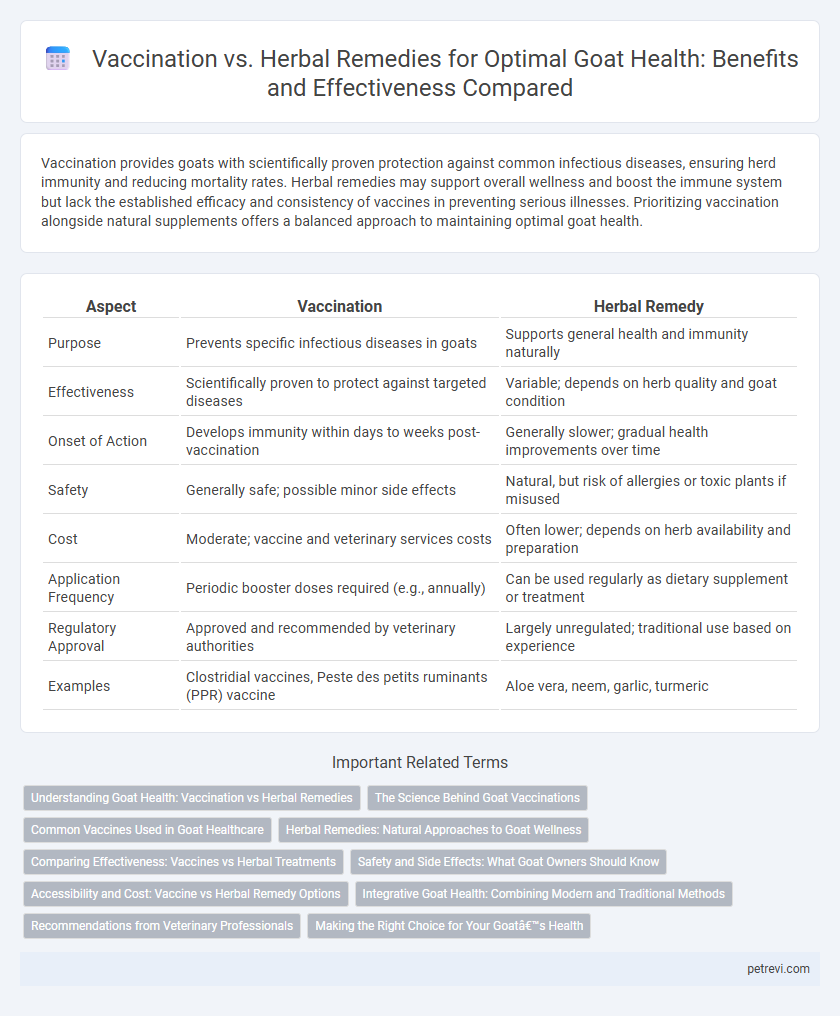Vaccination provides goats with scientifically proven protection against common infectious diseases, ensuring herd immunity and reducing mortality rates. Herbal remedies may support overall wellness and boost the immune system but lack the established efficacy and consistency of vaccines in preventing serious illnesses. Prioritizing vaccination alongside natural supplements offers a balanced approach to maintaining optimal goat health.
Table of Comparison
| Aspect | Vaccination | Herbal Remedy |
|---|---|---|
| Purpose | Prevents specific infectious diseases in goats | Supports general health and immunity naturally |
| Effectiveness | Scientifically proven to protect against targeted diseases | Variable; depends on herb quality and goat condition |
| Onset of Action | Develops immunity within days to weeks post-vaccination | Generally slower; gradual health improvements over time |
| Safety | Generally safe; possible minor side effects | Natural, but risk of allergies or toxic plants if misused |
| Cost | Moderate; vaccine and veterinary services costs | Often lower; depends on herb availability and preparation |
| Application Frequency | Periodic booster doses required (e.g., annually) | Can be used regularly as dietary supplement or treatment |
| Regulatory Approval | Approved and recommended by veterinary authorities | Largely unregulated; traditional use based on experience |
| Examples | Clostridial vaccines, Peste des petits ruminants (PPR) vaccine | Aloe vera, neem, garlic, turmeric |
Understanding Goat Health: Vaccination vs Herbal Remedies
Vaccination remains the most effective method to prevent contagious diseases such as Clostridial infections and Foot-and-Mouth Disease in goats, ensuring herd immunity and long-term health stability. Herbal remedies, including garlic and neem, provide supportive care by enhancing immunity and alleviating minor ailments but lack the proven efficacy to replace vaccines against serious infections. Integrating vaccination programs with herbal supplements optimizes goat health by combining scientifically validated protection with natural immune support.
The Science Behind Goat Vaccinations
Goat vaccinations are scientifically formulated to stimulate the immune system against specific pathogens, providing measurable protection and reducing disease prevalence in herds. Vaccines contain antigens that trigger antibody production, ensuring long-lasting immunity that herbs cannot guarantee. Unlike herbal remedies, which lack standardized dosage and proven efficacy, vaccinations undergo rigorous testing and regulatory approval to ensure their safety and effectiveness in preventing infectious diseases in goats.
Common Vaccines Used in Goat Healthcare
Common vaccines used in goat healthcare include Clostridium perfringens types C and D, tetanus toxoid, and contagious ecthyma (orf) vaccine, which are essential for preventing widespread infectious diseases. Vaccination ensures controlled immunity against fatal bacterial and viral infections, reducing mortality rates and improving herd productivity. While herbal remedies may support overall wellness, they do not replace the targeted protection provided by these critical vaccines.
Herbal Remedies: Natural Approaches to Goat Wellness
Herbal remedies offer a natural approach to goat wellness by utilizing plants like neem, garlic, and turmeric, which have antimicrobial, anti-inflammatory, and immune-boosting properties. These remedies can help manage common ailments such as parasitic infections, respiratory issues, and digestive disorders while minimizing chemical residues in meat and milk. Incorporating herbal treatments alongside proper nutrition and hygiene supports a holistic strategy for maintaining goat health.
Comparing Effectiveness: Vaccines vs Herbal Treatments
Vaccination provides proven immunity against specific goat diseases like clostridial infections, offering targeted and consistent protection through scientifically validated mechanisms. Herbal remedies, while popular for their natural components and fewer side effects, often lack standardized dosages and rigorous clinical trials to confirm efficacy against infectious diseases. Comparing effectiveness, vaccines deliver predictable prevention in herd health management, whereas herbal treatments may support general wellness but do not replace the critical role of vaccinations in disease control.
Safety and Side Effects: What Goat Owners Should Know
Vaccination for goats provides a scientifically proven safety profile with minimal side effects, reducing the risk of severe diseases like clostridial infections and foot rot. Herbal remedies, while popular among some goat owners for their natural origin, often lack comprehensive safety studies and can cause unpredictable allergic reactions or toxicity. Goat owners should prioritize vaccinations due to regulatory approval and consistent efficacy while considering herbal treatments cautiously and consulting veterinary professionals.
Accessibility and Cost: Vaccine vs Herbal Remedy Options
Vaccines for goats offer scientifically proven protection against specific diseases but often come with higher costs and require access to veterinary services, making them less accessible in remote or resource-limited areas. Herbal remedies, while generally more affordable and easier to obtain locally, lack standardized dosing and evidence-based efficacy, resulting in variable health outcomes. Choosing between vaccination and herbal treatments depends heavily on balancing budget constraints with the need for reliable disease prevention.
Integrative Goat Health: Combining Modern and Traditional Methods
Integrative goat health emphasizes combining modern vaccination protocols with herbal remedies to enhance disease resistance and overall vitality. Vaccinations provide targeted immunity against prevalent infectious diseases like enterotoxemia and contagious caprine pleuropneumonia, while herbal supplements such as neem and turmeric boost immune function and reduce inflammation naturally. This balanced approach leverages scientific advancements and traditional knowledge to optimize goat health sustainably.
Recommendations from Veterinary Professionals
Veterinary professionals recommend vaccination as the primary method to prevent infectious diseases in goats due to its proven efficacy and ability to provide long-term immunity. Herbal remedies may complement overall goat health but lack scientific validation and consistent results compared to vaccines. Emphasizing regular vaccination schedules and consulting veterinarians ensures optimal goat health and disease control.
Making the Right Choice for Your Goat’s Health
Vaccination remains the most effective method to prevent contagious diseases like Clostridial infections and Foot-and-Mouth Disease in goats, ensuring long-term immunity and reducing mortality rates. Herbal remedies may support overall health and boost immunity but lack scientific evidence to replace vaccines in controlling specific diseases. Prioritizing vaccination protocols recommended by veterinarians guarantees optimal protection, while herbal supplements can complement but not substitute this essential prevention strategy for your goat's health.
Vaccination vs Herbal remedy for Goat health Infographic

 petrevi.com
petrevi.com